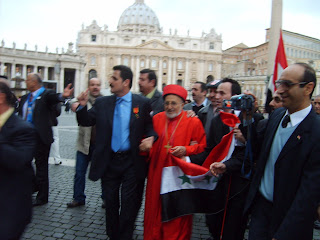(With apologies, since this should have been posted a couple of days ago. Those days have been lost to a bad cold.)
So what is meant by “the Oriental Church”? Where
exactly is the ecclesiastical “Orient”?
A rule of thumb might help. Take a map of Europe and
North Africa. Place your ruler along the eastern coast of Italy. Barring the
countries in central Europe, as you sweep your ruler round clockwise, the
countries it traverses, right round to those on North Africa’s Mediterranean
coast, are the home of Eastern Christianity, Catholic and Orthodox. All the way
down to Ethiopia and across to India. But nowadays you have to take into
account the various Diasporas.
I had the great honour of meeting a group of one
part of one element of those Diasporasa in Rome during the weekend of the
consistory in November 2007. These were a group of Iraqi Chaldean Catholics who had
emigrated to the USA. They were present to see and support their Patriarch, Emmanuel
III (Emmanuel-Karim) Delly, Archbishop of Baghdad, honoured by Pope Benedict with
elevation to the Sacred College. As Patriarch of Babylon of the Chaldeans, Cardinal
Delly joined the Order of Cardinal Bishops. As such, on the Sunday morning at
the Ring Mass he was Principal Co-Concelebrant with the Holy Father.
The pictures below were taken by me, using a friend’s
camera in St Peter’s Square on the Saturday
morning (November 24, 2007) immediately after the public consistory for the
naming of the new cardinals. Cardinal Delly is a lovely wee man. He greatly
impressed with the way he concelebrated on the Sunday morning. In Latin. The
love of his people for him was tangible. I must apologise for the fact that they are so poor. I’m not very good at taking pics, but to make matters worse, I got caught up in this scrum totally unexpectedly.
Pictures of His Beatitude Cardinal Mar Emmanuel III Delly,
Patriarch of Babylon of the Chaldeans.
In the early Church there were three major centres:
Rome, Alexandria and Antioch. In the earliest laws of the Church, the Bishops
of these three cities were accorded the status of a Patriarch and the Bishop of
Rome, as successor to Peter, was accorded the position of honour, he was primus inter pares. But each of the
Patriarchs governed within his own territory. The Bishop of Rome had no
jurisdiction over the other Patriarchs. And he did not appoint them. Nor did he
appoint their bishops.
It would take too long, and it would all be rather
boring, to recite the history of the development of the modern Patriarchates
and the Rites and Churches associated with them. But today there are 5 Eastern
Rites, each with a Patriarch. These, obviously, are geographically in the East.)
Within each Eastern Rite there are separate territorial Churches headed by a
Bishop, an Archbishop or a Major Archbishop. In all, there are 22 sui iuris Eastern Rite Churches in full
communion with Rome (this legal term means that they have full competence to
manage their own affairs; for example in Synod they elect their own bishops,
who are then approved by the Pope). These are:
Alexandrian Rite: Coptic Church (Patriarchal),
Ethiopic Church (Archiepiscopal);
Antiochean Rite: Maronite Church (Patriarchal),
Syro-Malankar Church (Major Archiepiscopal), Syrian Church (Patriarchal);
Armenian: Armenian Church (Patriarchal);
Chaldean (Syro-Oriental): Chaldean Church
(Patriarchal), Syro-Malabar Church (Major Archiepiscopal)
Byzantine (Constantinian): Albanese Church,
Belarussian Church, Bulgarian, Croation Church (Episcopal), Greek Church,
Greek-Melkite (Patriarchal), Hungarian Church (Episcopal), Italo-Albanese
(Episcopal), Macedonian, Romanian Church (Major Archiepiscopal), Ruthenian
Church (Archiepiscopal), Slovak Church (Major Archiepiscopal), Ukrainian Church
(Major Archiepiscopal).
With the exception of most of the Byzantine Rite
Churches, the association with the Middle East should be obvious.
NOTE: In the West, there is only one real Patriarch,
the Pope. However, there are two minor Patriarchatess: the Patriarch of Venice
(dating from 1457) and the Patriarch of Lisbon (October 22, 1716, and the
Golden Bull In Supremo Apostolatus Solio).
In the Latin Rite there are also the Patriarch of Jerusalem and the Patriarch
of the East Indies [dating from 1886, the Archbishop of Goa and Damão, India].





No comments:
Post a Comment